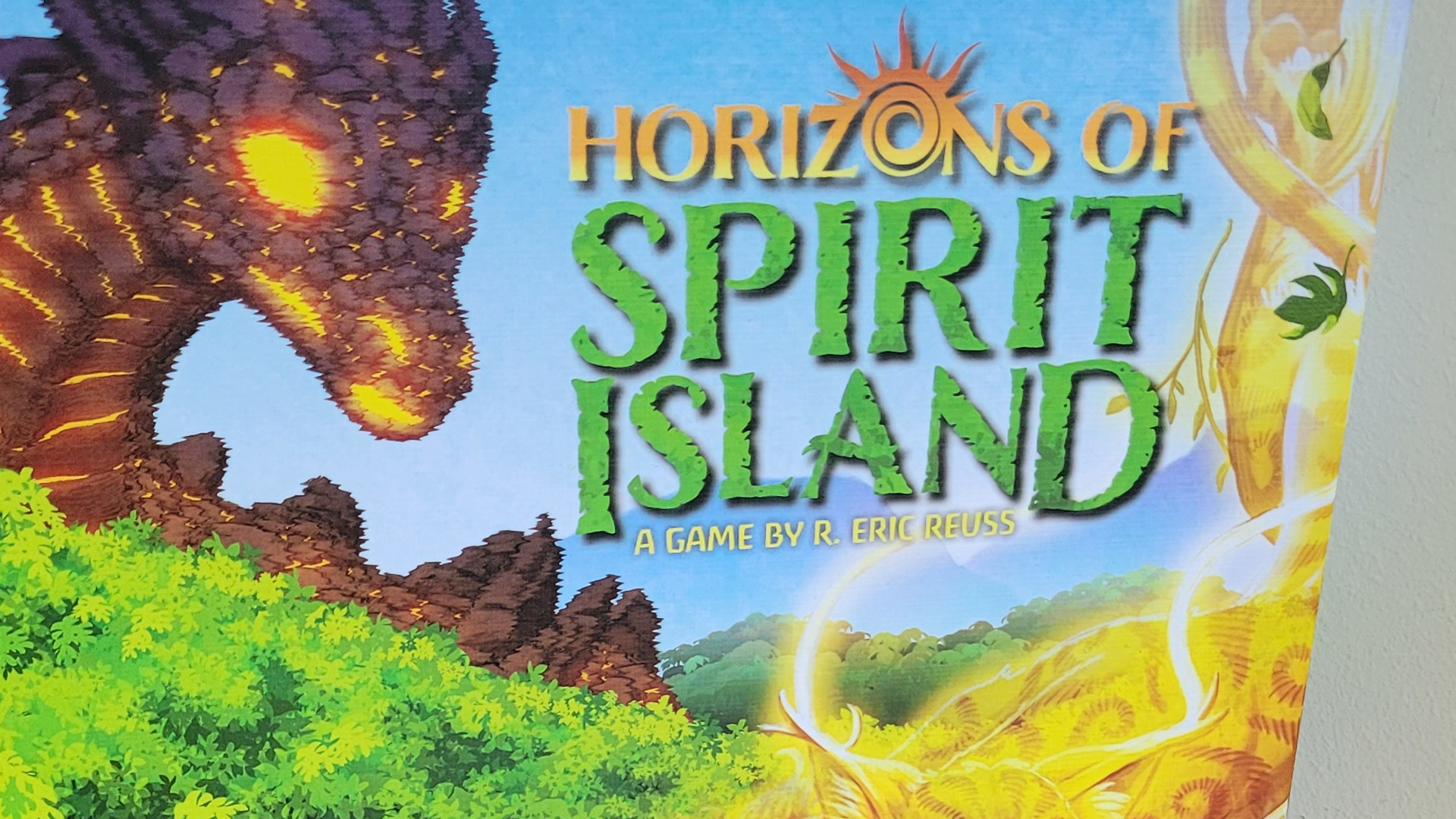GamesRadar+ Verdict
Even though this is billed as an introduction to the beloved game, Horizons of Spirit Island is by no means less strategic than its predecessor. Less premium components help keep costs down, and the original's tactical complexity is allowed to shine unblemished. However, this does mean that the game can be hard to learn despite being pitched as more accessible.
Pros
- +
Tough and highly varied strategy challenge
- +
Fosters genuine cooperation among the players
- +
Appealing anti-colonial theme
Cons
- -
Hard to learn, and the included 'introduction' doesn’t help much
- -
Poor-quality components, especially compared to the full Spirit Island
Why you can trust GamesRadar+
Horizons of Spirit Island is a cut-price, stand-alone version of Spirit Island, one of the most popular and acclaimed cooperative board games ever produced. But what’s been cut down isn’t the gameplay - only the variety and production quality. That means you still get the full, deep, and demanding gameplay of the original, albeit with fixed boards instead of tiles and cardboard chits instead of miniatures.
So, is Horizons of Spirit Island worth getting instead of the original? Should you grab if you already have its predecessor? Let's dive in.
Features & design
Price | $29.99 / £29.99 |
Ages | 14+ |
Players | 1 - 3 |
Lasts | 90 - 120mins |
Complexity | High |
Play if you enjoy | Spirit Island |
- A cheaper version of Spirit Island
- Still the same tactical experience
- Less premium components
Horizons of Spirit Island is billed as an introductory version of the full title (which is often called one of the best board games on shelves right now), which has a reputation for dense complexity. That means it's more affordable and slightly less flashy in terms of components. The core concept remains the same, though; you play as supernatural entities that are trying to protect their home from invaders who are ruining the landscape and killing its native inhabitants (called 'Dahan').
Basically? It's not quite as wholesome as the cover artwork would suggest.
In terms of how it works, each player takes the role of a spirit with a unique set of stats and starting cards. Among the many ways the spirits differ is in their growth options, which allow them to do things like gain cards, gain energy to play cards, or spread their influence around the map.
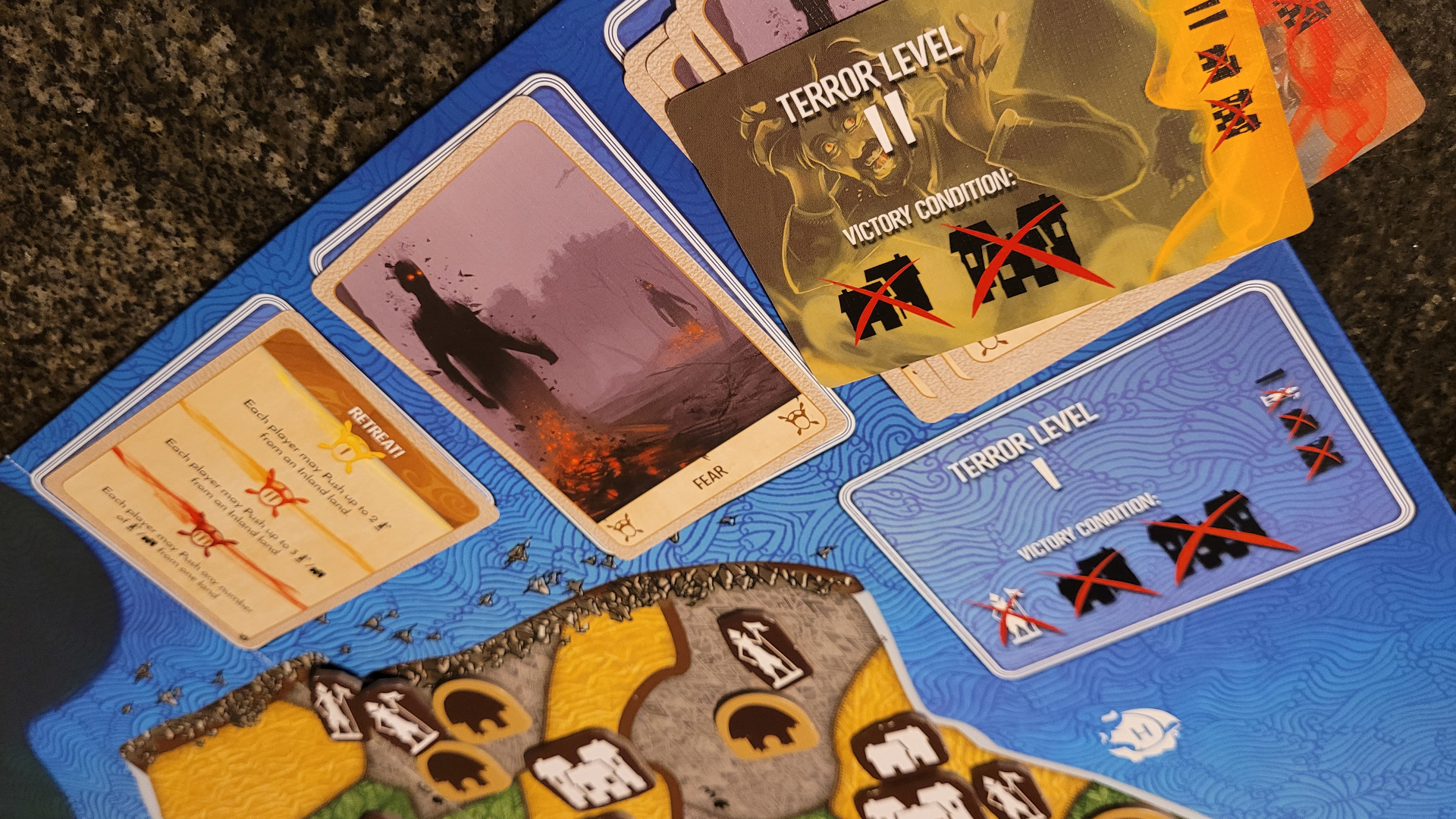
Your first choice each turn is to decide how your spirit will grow, and then implement the effects of your selection while selecting cards with abilities that essentially boil down to damaging invaders, defending against their attacks, buffing yourself or your fellow players, and moving things around on the board.
Your goal is to try and drive these invaders off the island before they cause too much damage. Often, this means destroying every colonist unit on the board. However, you can also scare them off by generating fear either through card effects or from destroying towns and cities. Build enough, and you’ll get a fear card with a helpful effect. Get through enough fear cards, and you’ll raise the terror level, making further fear effects more powerful. If you can empty the whole deck, then that’s a secondary win condition.
It’s also worth repeating that, rules-wise, this is the full Spirit Island experience
To help you acclimatize, Horizons offers a full first-turn playthrough. However, this isn’t all that helpful as it doesn’t always explain why you do certain things, and the included rulebook is somewhat obtuse. It’s also worth repeating that, rules-wise, this is the full Spirit Island experience; you just get less variety and downgraded components. The included spirits can even be used in the full game if you decide to go the whole hog.
Gameplay
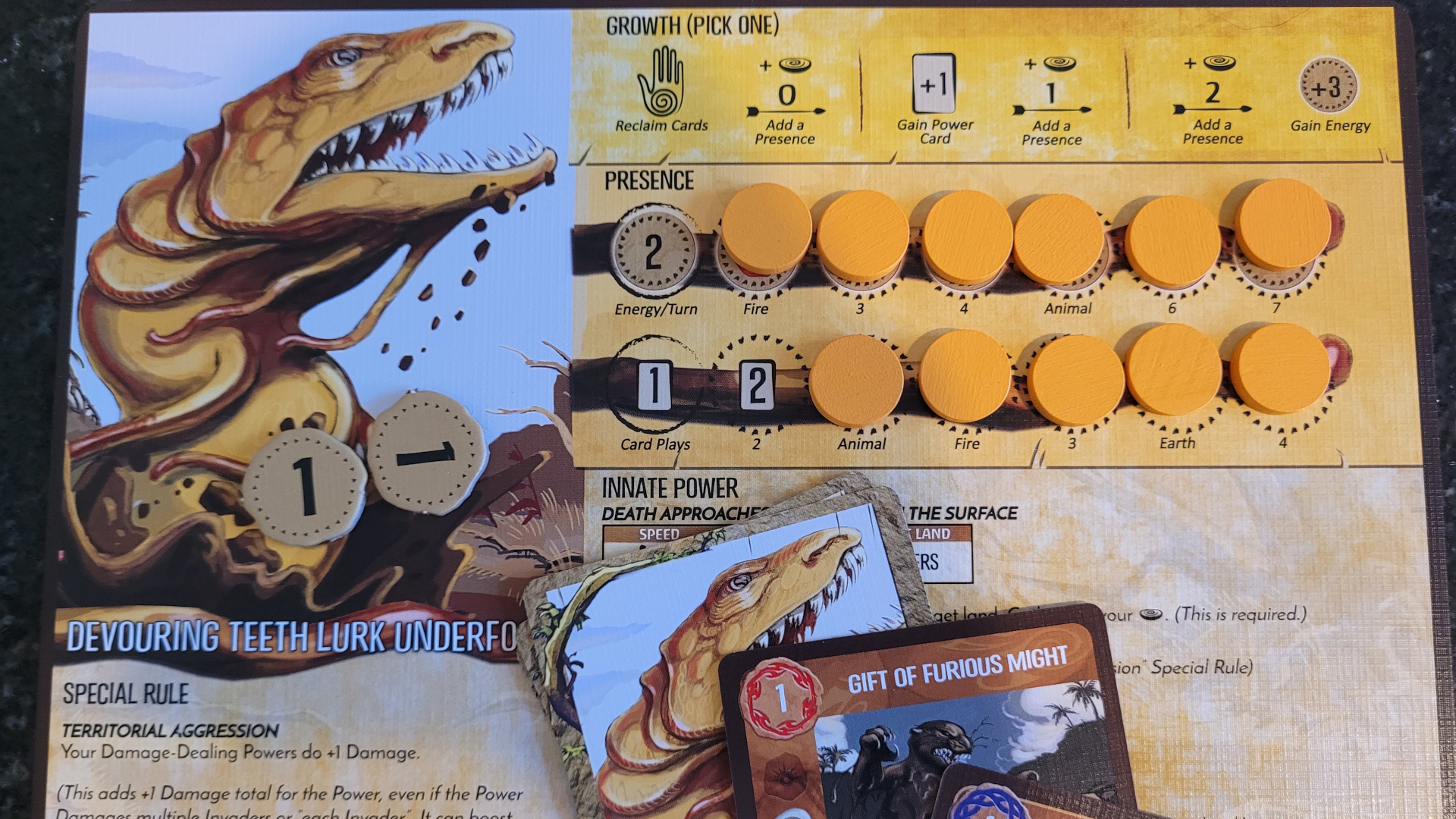
- Fosters a sense of genuine cooperation through the sheer volume of interlocking possibilities
- Deterministic gameplay and fun theme keeps you challenged and engrossed
- Tense curve that’ll leave you feeling like victory is impossible, right up until you manage it
Most modern cooperative games try and mix things up for the players, using hidden information to reduce the chance of one player bossing the others around. Horizons of Spirit Island, like its parent game, doesn’t need to. Instead, it creates cooperation by simply presenting the players a vertical wall of overlapping strategic possibilities that they somehow need to navigate. You have to cooperate because there are simply too many paths, and too many obstacles, for one player to parse effectively.
It’s hard to capture the full flowering of this effect without playing it, but for an example, take the speed system. Almost inevitably the powers you want to bring to bear early, to trim down the invaders before they act, are slow, and the ones you could wait until later to use are fast. You have limited card plays each turn, so you’ll likely need to mix in some defensive cards, diluting your ability to take the fight to the enemy. It’s a tricky balancing act, especially since you’ll need to spend a growth action to get your cards back every few turns.
Win or lose, this contest to climb the hill and speed down the other side offers a superbly satisfying arc of tension
But wait: what about the buffs that some spirits have? Perhaps you can use a buff to get the extra damage you need to knock out a city instead of an explorer. Or enough defence to let the Dahan survive and fight back. Or even a speed boost. That’s down to whether you can communicate and coordinate effectively with your fellow spirits to get buffs you need while still leaving them the leeway to act themselves. With multiple spirits playing multiple cards, this strategy problem quickly expands to become exponential. It’s a classic case of too much to do, too few things to do it with, except the problem is split among all the players and the solutions are far too convoluted to be obvious.
Yet, Horizons of Spirit Island is almost totally deterministic. There’s no randomness here, other than the territories the invaders attack and the selection of new powers to choose from when you complete a growth action that gets you new cards. So it’s down to you to try and pick apart the options and make the best choices. Given the game’s theme, it can often feel like a genuinely heavy weight has fallen on your collective shoulders as you struggle to repel the destructive, rapacious colonists from your pristine corner of paradise.
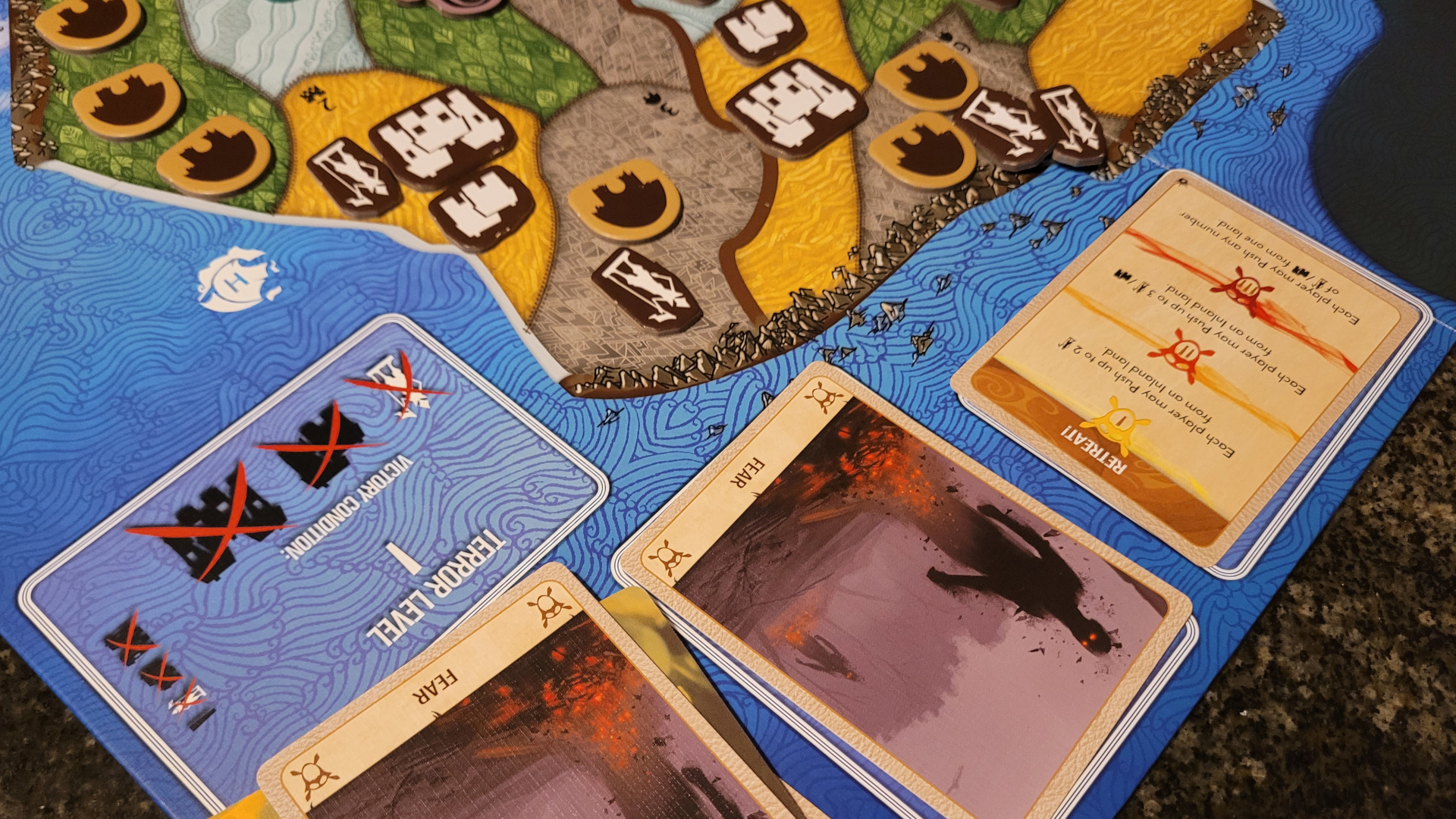
For much of the game, it’ll feel like this is an impossible struggle. Colonists multiply with terrifying speed, and it’s all you can do to stop them stripping the island bare, let alone get a toe-hold in scaring them off or destroying them. Every fear card flipped, every city destroyed, feels like a desperate victory to cheer you on in the face of overwhelming odds. Until, quite suddenly, it isn’t. As your spirits grow and acquire new powers, at some point you’ll crest a hill where you can really make a difference.
Not that this makes things easy, of course. There’s still the interweaving web of strategy to plot out each turn, except now you’re racing against the clock or the spread of blight to see if you can use your newfound competence to beat the game before it’s too late. Win or lose, this contest to climb the hill and speed down the other side offers a superbly satisfying arc of tension and narrative for your group to enjoy.
Should you buy Horizons of Spirit Island?
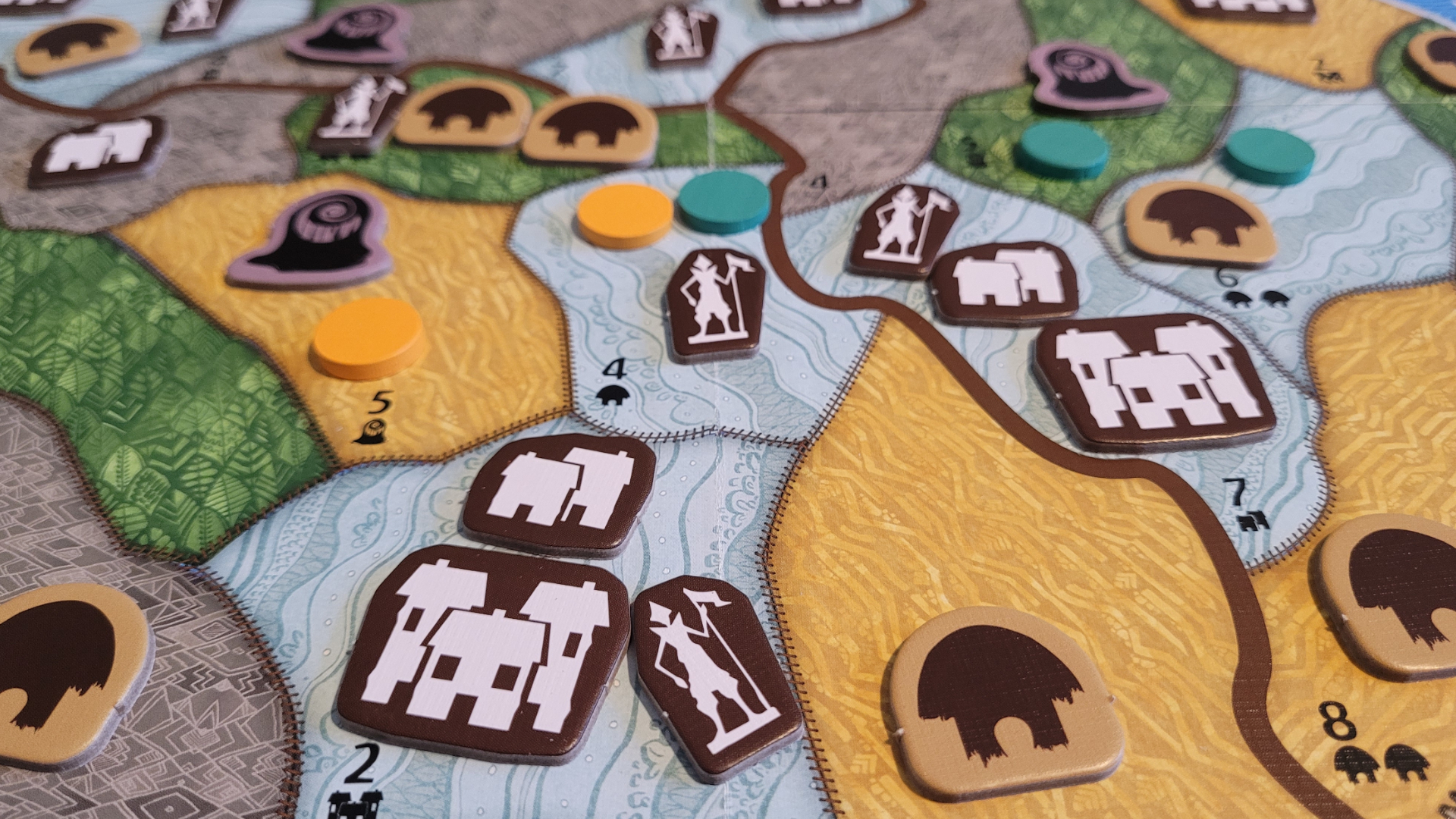
There’s a good reason Spirit Island is so acclaimed among board games for adults, and if you’ve been hankering to try it, or had your interest piqued by this review, Horizons of Spirit Island is a pretty good starting point. The lack of much to smooth the learning curve is regrettable, but the price point is very appealing and, if you enjoy the experience, the fact this is the full game without miniatures gives it plenty of longevity. Existing fans can leave this alone: the added spirits aren’t interesting enough to justify the purchase. Otherwise, if you’ve any interest in playing cooperatively with your group, then it’s worth a punt: you might well be surprised.
Buy it if...
You’re interested in Spirit Island but put off by the cost
If you want a more affordable route into the beloved team game, Horizons is ideal. While its components are less flashy, it's much cheaper as a result.
You enjoy a very rich and varied strategic challenge
Although it's cheaper, this isn't a 'my first Spirit Island' or some dumbed-down version of the original. It's just as layered and equally tactical, so fans of putting their gray matter to work will appreciate Horizons.
Don't buy it if...
You already own the original game
If you're a veteran of the OG Spirit Island, you won't find much for you here - it's simply a cheaper version of the same thing.
You feel you’ll struggle with a lot of rules or strategic complexity
If party games are more your speed, and you struggle with 'thinky' games in general, Horizons of Spirit Island won't be for you.
How we tested Horizons of Spirit Island
Along with playing games of Horizons of Spirit Island, I spent time comparing it to the original (something I already had in my collection). My process involved considerations around accessibility, how easy it was to learn, and what it was like in action. For more on our process, see our guide to how we test.
This review copy of Horizons of Spirit Island was provided by the publisher.
Matt is a freelance writer specialising in board games and tabletop. With over a decade of reviews under his belt, he has racked up credits including IGN, Dicebreaker, T3, and The Guardian.
